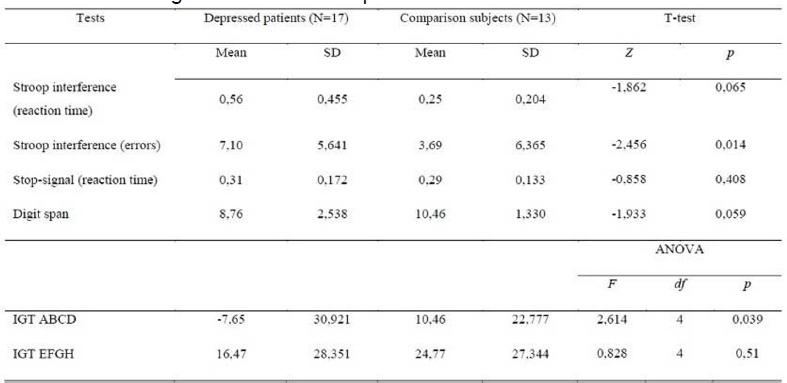Topic: EPW18 – e-Poster Walk Session 18: Depression part 1
Article: 0629
Cognitive Disorder as a Predisposing Factor for Mental Depression
-
- Published online by Cambridge University Press:
- 15 April 2020, p. 1
-
- Article
-
- You have access
- Export citation
Article: 0630
The Impact of Guidance On Citalopram's Effects On the QT Period On the Practice of Clinicians
-
- Published online by Cambridge University Press:
- 15 April 2020, p. 1
-
- Article
-
- You have access
- Export citation
Article: 0631
Clinical Staging in Depressive Disorders
-
- Published online by Cambridge University Press:
- 15 April 2020, p. 1
-
- Article
-
- You have access
- Export citation
Article: 0632
Depression: the Cognitive Orientation Approach
-
- Published online by Cambridge University Press:
- 15 April 2020, p. 1
-
- Article
-
- You have access
- Export citation
Article: 0633
Implementation of Bright Light Therapy as Adjuvant Treatment for Depression and Insomnia Among Inpatients
-
- Published online by Cambridge University Press:
- 15 April 2020, p. 1
-
- Article
-
- You have access
- Export citation
Article: 0635
Tickling Rats to Screen for Depressive-like Behavior in Preclinical Research
-
- Published online by Cambridge University Press:
- 15 April 2020, p. 1
-
- Article
-
- You have access
- Export citation
Article: 0636
Peculiarities of the Compliance in Male Patients with Depressive Disorders
-
- Published online by Cambridge University Press:
- 15 April 2020, p. 1
-
- Article
-
- You have access
- Export citation
Article: 0638
Depression Diagnostic of Patient Health Questionnaire-9: Pilot Study
-
- Published online by Cambridge University Press:
- 15 April 2020, p. 1
-
- Article
-
- You have access
- Export citation
Article: 0639
Clinical Factors Associated with Response to Treatment in a Population of Depressed Patients Treated in General Practice: the Hedonie Study
-
- Published online by Cambridge University Press:
- 15 April 2020, p. 1
-
- Article
-
- You have access
- Export citation
Article: 0640
The Predictive Value of Obstetrical and Neonatal Parameters in the Occurence of Postnatal Depression in a Romanian Sample of New Mothers
-
- Published online by Cambridge University Press:
- 15 April 2020, p. 1
-
- Article
-
- You have access
- Export citation
Article: 0641
Depression and Parkinson's Disease: Role of the Locus Coeruleus
-
- Published online by Cambridge University Press:
- 15 April 2020, p. 1
-
- Article
-
- You have access
- Export citation
Article: 0642
Cognitive Functioning of Depressed Patients with History of Suicidal Attempt
-
- Published online by Cambridge University Press:
- 15 April 2020, p. 1
-
- Article
-
- You have access
- Export citation
Topic: EPW19 – e-Poster Walk Session 19: Eating Disorders, Personality and Personality Disorders
Article: 0643
Multiple Family Therapy for Adolescents with Anorexia Nervosa: a One-year Follow-up
-
- Published online by Cambridge University Press:
- 15 April 2020, p. 1
-
- Article
-
- You have access
- Export citation
Article: 0644
Involvement of Students in an Integrated Course of Action in the Field of Eating Disorders in the Life Cycle.
-
- Published online by Cambridge University Press:
- 15 April 2020, p. 1
-
- Article
-
- You have access
- Export citation
Article: 0645
Latest Developments in the Psychopharmacology of Anorexia Nervosa
-
- Published online by Cambridge University Press:
- 15 April 2020, p. 1
-
- Article
-
- You have access
- Export citation
Article: 0646
How to Assess Coping Strategies in Relatives of Patients with Eating Disorders?
-
- Published online by Cambridge University Press:
- 15 April 2020, p. 1
-
- Article
-
- You have access
- Export citation
Article: 0648
Ambivalence and Resistance in a Patient with Anorexia Binge-purging: a Case Report
-
- Published online by Cambridge University Press:
- 15 April 2020, p. 1
-
- Article
-
- You have access
- Export citation
Topic: EPW20 – e-Poster Walk Session 20: Emergency Psychiatry
Article: 0649
Initial Assessment of Psychosis in the Emergency Department
-
- Published online by Cambridge University Press:
- 15 April 2020, p. 1
-
- Article
-
- You have access
- Export citation
Article: 0650
Factors Predicting the Presence of Suicidal Ideation in Patients Presenting to the Emergency Room
-
- Published online by Cambridge University Press:
- 15 April 2020, p. 1
-
- Article
-
- You have access
- Export citation
Article: 0651
Case Reports of Inhaled Loxapine in the Treatment of Agitated Patients
-
- Published online by Cambridge University Press:
- 15 April 2020, p. 1
-
- Article
-
- You have access
- Export citation


